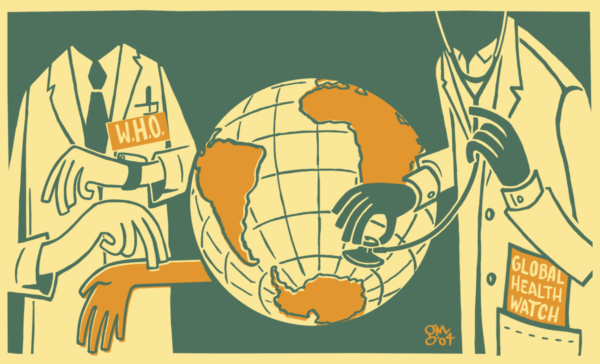The ongoing COVID-19 pandemic gives the new field of planetary health a unique chance to prove itself. Since the Rockefeller Foundation-Lancet Commission report’s release in 2015 (1), planetary health has been met by a mixture of both excitement and skepticism. Young scholars from diverse disciplines are energized by the idea of transdisciplinary collaboration for solving 21st century’s existential problems. The added value of planetary health when other frameworks and paradigms such as One Health and EcoHealth exist has been questioned. Planetary health’s global diffusion has been in general slow.
More than a collection of problems or new academic discipline, planetary health offers a positive vision for the future of human civilization and the planet on which it depends. This idea was conceived in response to the Anthropocene, the new geological epoch highlighting the powerful influence of human beings altering the planet they inhabit. Following the same logic, human-driven ecosystem degradation can be corrected by human-inspired system redesign. If this is the goal, then planetary health cannot remain as an academic endeavor that interests itself in simply unraveling connections between downstream health outcomes and the surrounding physical world; such focus on the clinical and epidemiological is convenient and myopic. Instead, the emerging planetary health community must look way more upstream, building a global movement that will not only critically analyze the political and economic forces that destroy the health of both people and the planet, but also attempt to fix and reshape them.
COVID-19 has been described as a critical juncture for human civilization, opening the door to previously unthinkable reforms (2). Pre-pandemic problems of socioeconomic and gender inequality, failing health systems, and environmental degradation have been magnified by the COVID-19 crisis. Nationwide lockdowns and social distancing also brought to attention long-neglected issues such as disregard for the care economy including household labor and people’s right to space. The potential to transform work and mobility arrangements to the promise of local production of essential commodities is also being harnessed. Ultimately, the worldwide quarantine that is keeping people inside their homes illuminates what really matters most in contemporary life – basic needs such as access to food, water and internet connectivity, and intangible assets such as family connection and purposeful work. This global crisis is an invitation to a Copernican re-think about what things must be truly valued in society (3).
Now that the global economy is on a pause, COVID-19 provides a glimpse of four processes – 4 D’s – which can move humanity towards a better planetary health future. The sudden closure of factories and financial markets may be resulting in a temporary “degrowth” of national economies – initially painful but potentially beneficial for human health in the long run if safety nets and investments in life-supporting enterprises are put in place. The halt in economic activities such as air and land travel and fossil fuel-driven electricity generation is also hinting at how “decarbonization” may be started; a better strategy that stabilizes the climate without substantial human cost – unlike in the case of a pandemic – must therefore be pursued. Travel bans and border closures disrupted cross-border movement of people and products – perhaps an early sign of “deglobalization”; alternative measures that harness our interconnectedness without exacerbating inequalities and polluting the planet must therefore be explored. Respoonses in Asain countries in the early phase of their COVID-19 in comparison to the now visible vulnerabilities of the developed nations of Europe and North America are a stark reminder of the importance of “decolonization” .

Reconstructing the post-COVID political economy will require bringing together not just the health professionals and natural scientists, but also social scientists, ecological economists, philosophers, and politicians. The Commission’s report highlighted three fundamental challenges shared by all of planetary health’s “wicked problems” – limited imagination, knowledge gaps, and weak governance. While much attention has so far been devoted by universities to research and information issues, imagination and governance challenges were unfortunately put on the side. To unpack and reconfigure planetary health’s political economy, these challenges must be addressed head on in a “consilience” with these neglected disciplines (4).
For this much-needed system reboot, planetary health can begin with considering existing alternative blueprints for a just and sustainable future. The most notable of these proposals is the concept of the “Doughnut Economy” (5) – which was recently described as a “pandemic-resistant” economy (6) and is already adopted by the city of Amsterdam for its post-COVID exit plan (7). Other cities, as well as communities, universities, businesses, nations, and international organizations must follow Amsterdam’s example. The Sustainable Development Goals need to be revisited considering what old and new problems COVID-19 has revealed. A fundamental reimagining of planetary health’s political economy in the post-COVID era is not just necessary but non-negotiable.
About the author
A Filipino physician, Renzo Guinto (@RenzoGuinto) is the Chief Planetary Doctor of PH Lab and recent Doctor of Public Health graduate of Harvard University.
Conflicts of Interest:
No conflict of interest to declare
Editorial Note: There were some small typographical errors which as been fixed on 25 Apr 2020.
References
- Whitmee S, Haines A, Beyrer C, et al. Safeguarding human health in the Anthropocene epoch: report of The Rockefeller Foundation—Lancet Commission on planetary health. Lancet 2015; 386: 1973–2028.
- Green D. COVID-19 as a Critical Juncture. March 31, 2020. Draft Document. https://oxfam.app.box.com/s/l19pcuea2z49f8dv5zt3ph511otcxokv.
- Mazzucato M. The Value of Everything: Making and Taking in the Global Economy. New York: Public Affairs, 2018.
- Wilson, EO. Consilience: The Unity of Knowledge. 1st Vintage Books ed. New York: Vintage Books/Random House, 1999.
- Raworth, K. Doughnut Economics: Seven Ways to Think like a 21st Century Economist. White River Junction, Vermont: Chelsea Green Publishing, 2017.
- Revkin A. Herman Daly and Kate Raworth on Pandemic-Resistant Economies. Youtube. March 30, 2020. https://www.youtube.com/watch?v=rnxCJ3Cqbto.
- Boffey D. Amsterdam to embrace ‘doughnut’ model to mend post-coronavirus economy. The Guardian. April 8, 2020. https://www.theguardian.com/world/2020/apr/08/amsterdam-doughnut-model-mend-post-coronavirus-economy